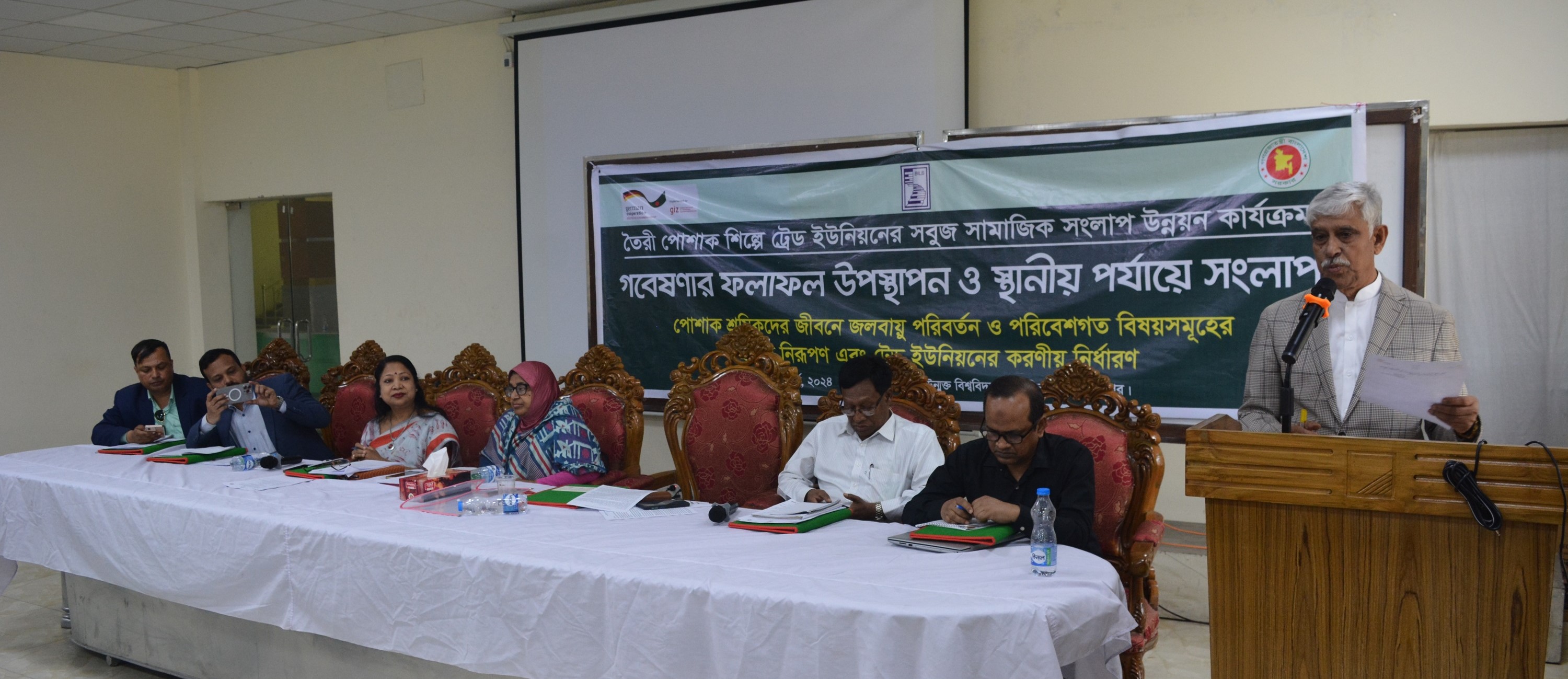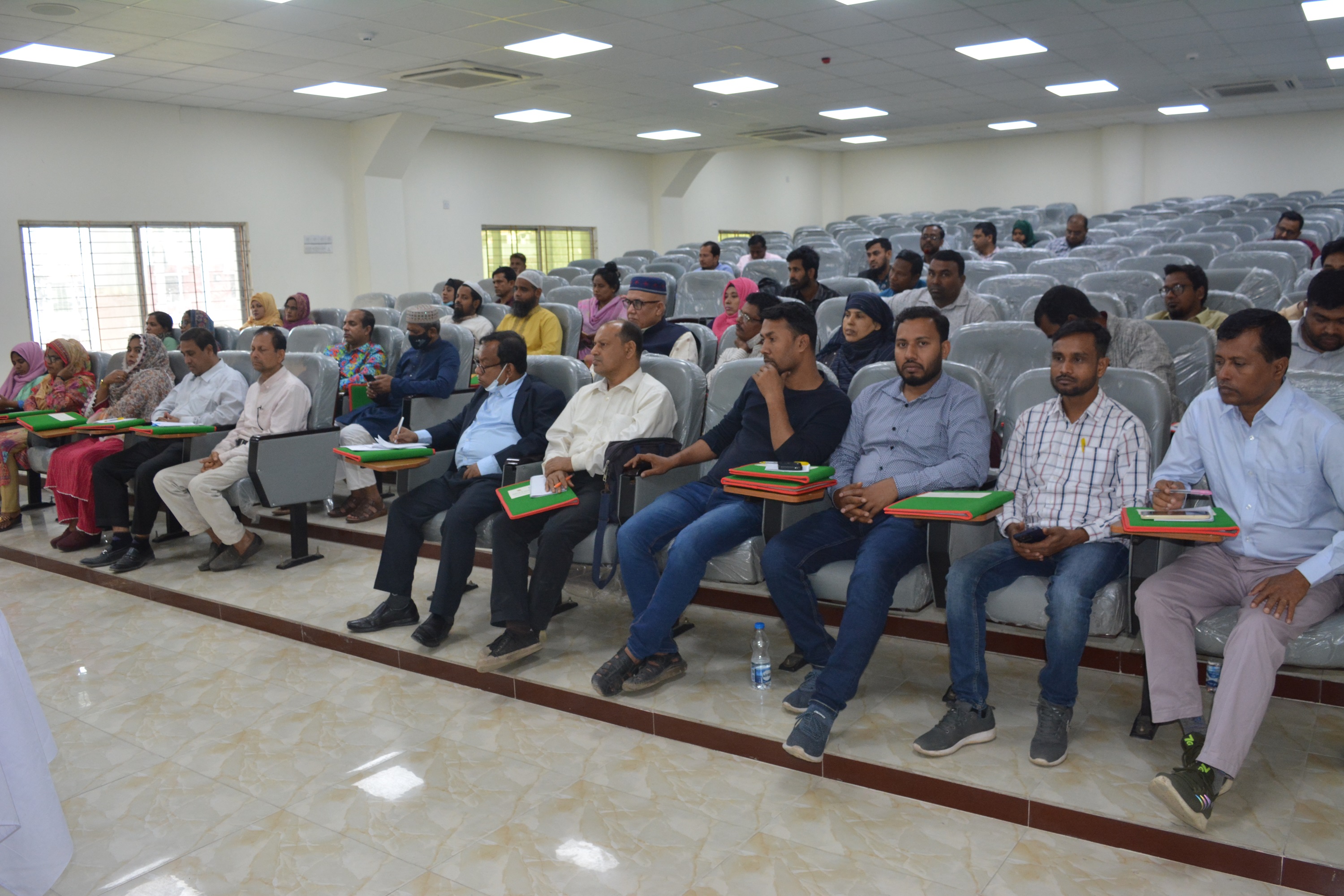Presentation of the research report titled “Assessing Exposure and Vulnerabilities of RMG Workers to Climate Change and Environmental Impact and the Role of TUs” and local dialogue was held on 10 March 2024 at Bangladesh Open University, Seminar Hall. Azmat Ulla Khan, Chairman, Gazipur Development Authority spoke as the chief guest on the occasion, while Shamsunnahar Bhuiyan, Secretary, Executive Counci l, BILS was on the chair. BILS Deputy Director and Chief Researcher Monirul Islam presented the information obtained in the research through Power Point presentation.
l, BILS was on the chair. BILS Deputy Director and Chief Researcher Monirul Islam presented the information obtained in the research through Power Point presentation.
The chief guest said in his written speech that Gazipur is currently one of the main industrial cities of Bangladesh. Gazipur Development Authority has been established based on the Gazipur Development Authority Act 2020 with a view to planned development, urban planning and developmental activities. One of the main goals of this organization is to build modern and well-planned cities. Responsibilities and functions of the organization include formulation of master plan, development, control of unplanned development, removal of illegal structures, ensuring housing for homeless slum dwellers, creation of civic amenities, promotion of investment and adoption of public welfare schemes. At the same time, prevention of global warming, reduction of carbon emissions are included.
 Azmat Ulla Khan said, the industrial city of Gazipur is home to a large number of low-class and poor labourers. The vast majority of these workers are victims of climate change and most of them are women and poor people. This population without housing support is facing the ‘heat island effect’ in Bengali meaning ‘the city is like a hot island’. One of the reasons is fossil fuel used in most of the factories, due to which the city of Gazipur is actually becoming a hot island. Moreover, due to lack of adequate housing, social security system for the low income people, these poor working class are facing the worst loss. Due to living in dirty and unsanitary environment, they are suffering from various diseases. According to data from Sohrawadi Medical College and Hospital in Dhaka, the issue of asthma and pneumonia patients in Gazipur district has come up. It is very important to increase social security, education, health, housing and all civil facilities for this poor working population who are helpless due to climate change. The need of the hour is to arrange planned housing for them first.
Azmat Ulla Khan said, the industrial city of Gazipur is home to a large number of low-class and poor labourers. The vast majority of these workers are victims of climate change and most of them are women and poor people. This population without housing support is facing the ‘heat island effect’ in Bengali meaning ‘the city is like a hot island’. One of the reasons is fossil fuel used in most of the factories, due to which the city of Gazipur is actually becoming a hot island. Moreover, due to lack of adequate housing, social security system for the low income people, these poor working class are facing the worst loss. Due to living in dirty and unsanitary environment, they are suffering from various diseases. According to data from Sohrawadi Medical College and Hospital in Dhaka, the issue of asthma and pneumonia patients in Gazipur district has come up. It is very important to increase social security, education, health, housing and all civil facilities for this poor working population who are helpless due to climate change. The need of the hour is to arrange planned housing for them first.
He mentioned, meanwhile, in a survey of 300 garment workers organized by the Gazipur Development Authority and conducted by the students of the Department of Urban and Regional Planning of Jahangirnagar University, it could be seen that 70 percent of the workers are women and 87 percent of them live in rented accommodation temporarily. However, 50 percent of them are not interested in permanent residence in Gazipur city. This is because they are dissatisfied with the lack of civic amenities in city life. Basically, they cannot enjoy any pleasures of city life due to inadequacy of civic services, housing and entertainment facilities.
 He added, in addition, most of these working communities are exposed to climate change and are in vulnerable positions. A significant information is found in the said study, 43 percent of the children of the workers working in the factories are at home alone during the day. 23% of them stay in the neighborhood or with close relatives and only 7% go to school while only 2% of factory daycare centers have the capacity to ensure child safety. 43 percent of the said workers are very interested in accommodation/accommodation in this city. Considering the mean and standard deviation of the data obtained in the said research, SPSS analysis shows that they are able to pay installments of up to 7500 taka per month for permanent housing, whereas currently they are paying their monthly housing cost from 1500 to 7000 taka. But they prefer flats of 800 square feet, smaller flats than that. Considering all these factors, the Gazipur Development Authority has the capacity to develop well-planned low-income housing projects, but due to financial and other constraints, it has not become feasible. But in the future plan, if the supply of financial funds is guaranteed, the housing project will be taken up to ensure the social and environmental protection of the workers.
He added, in addition, most of these working communities are exposed to climate change and are in vulnerable positions. A significant information is found in the said study, 43 percent of the children of the workers working in the factories are at home alone during the day. 23% of them stay in the neighborhood or with close relatives and only 7% go to school while only 2% of factory daycare centers have the capacity to ensure child safety. 43 percent of the said workers are very interested in accommodation/accommodation in this city. Considering the mean and standard deviation of the data obtained in the said research, SPSS analysis shows that they are able to pay installments of up to 7500 taka per month for permanent housing, whereas currently they are paying their monthly housing cost from 1500 to 7000 taka. But they prefer flats of 800 square feet, smaller flats than that. Considering all these factors, the Gazipur Development Authority has the capacity to develop well-planned low-income housing projects, but due to financial and other constraints, it has not become feasible. But in the future plan, if the supply of financial funds is guaranteed, the housing project will be taken up to ensure the social and environmental protection of the workers.
It should be noted that a large part of the workers have sought livelihood in the hope of finding shelter in the city as refugees due to the effects of climate change. Among these reasons, they are climate refugees due to natural disasters, cyclones, rising water levels, river erosion etc. So basically they are working in various industrial factories in the city for the sake of livelihood. In this case multifaceted response of climate change is observed.
Azmat Ulla Khan said, in such a situation, emphasis should be placed on ensuring health, education and social security of these lower class workers and a housing master plan should be adopted for them immediately. If small apartment based multi-storied buildings can be constructed under the housing master plan for this poor population, playgrounds, children’s schools, grocery stores, day care centers, medical centers can be placed under the buildings without wasting agricultural land and multi-storied buildings can be constructed from where they can be walked. Workers can go to work but the pressure on roads and vehicles will be reduced and dense afforestation around the buildings will keep them away from the dust and fumes of the factories, but it will be possible to develop a satisfactory standard of living. Equality-based development will be accelerated if flats or apartments are allocated at a limited price by identifying climate refugees in the light of the principles of such a project for low-income people.
He said, although this would require a large one-time investment, it would ensure housing for a large number of workers, which would spur production growth. Poor people from different districts of Bangladesh earn their living in Gazipur. If it is possible to ensure education, health and other social services for them, it will be able to make a significant contribution to the national human resource development index. It should be noted that most of these workers leave the city life and go back to their respective villages. City means crisis for them, there is no social security for them, no housing facility for them. In this city they are unable to make ends meet on their meager income. Because a large portion of their income is spent on housing alone. In such a situation, it is essential to create various civic amenities like good quality educational institutions, medical centers, hospitals, recreational facilities, community centers, parks and open spaces. Again, it is necessary to develop public transport system for the large working population. Gazipur city, the district that receives 40% remittances from Bangladesh’s garment sector, needs its own metro rail or public transport system within Gazipur for commuting. Even if there are financial constraints at present, a well-thought-out plan for the future is required.
He added, some experts of Dhaka University have given suggestions to prevent urban warming by planting sufficient amount of trees, protecting and creating water bodies, through which the overall temperature of the city can be reduced up to 2 degree centigrade. For this purpose through greening program plantation of trees can be made mandatory by encouraging various open lands, roadside fallow lands and even vacant lands of various public or private institutions, house roofs, walled vacant lands. A green belt of ten feet should be built around the factories, which will help in getting ‘Green Industry Certificate’ according to international standards. In the competitive context of the garment sector in the international market, this green industry or green building can bring us the ability to increase our exports several times. Therefore, in today’s green dialogue, the expectation of Gazipur Development Authority is to build a green and planned city through mutual participation of factory owners and workers, ordinary citizens, development authorities, planners, engineers, researchers and journalists.
Maqbul Hossain, Research Officer of Environment Department, Jalal Khan, Assistant Inspector of Factories and Institutions Inspection Department, Nazma Yesmin, BILS Director, Local Commissioner, National Level Trade Union and Human Rights Organization, Government and Private Institutions, Economists, Lawyers, Journalists and other professional organizations spoke on the occasion. The speakers said that the government, local government, owners and trade unions should work together to reduce the impact of environment and climate change on the garment industry. In addition, they specifically mention the need to work at the policy-making level to create social and environmental standards for workers.
A total of 66 participants were present at the event, while 50 of them were men and 16 were women.
